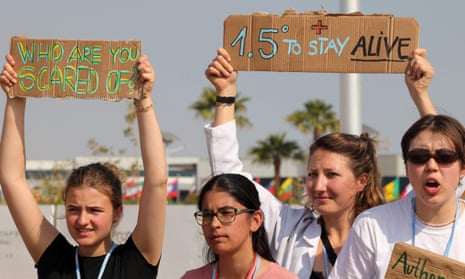Fear of backsliding on Glasgow pledges dominates Cop27
Tentative drafts are emerging but some countries appear to be seeking to water down commitments agreed last year
 Climate protesters in Egypt remind delegates of the 1.5C target but China and India want to emphasise the Paris agreement that had an upper limit of a 2C rise. Photograph: Fayez Nureldine/AFP/Getty Images
Climate protesters in Egypt remind delegates of the 1.5C target but China and India want to emphasise the Paris agreement that had an upper limit of a 2C rise. Photograph: Fayez Nureldine/AFP/Getty ImagesFear of countries backsliding on their commitments to tackle the climate crisis dominated the Cop27 UN climate talks in Egypt on Tuesday, as the first tentative drafts started to emerge of key potential decisions.
Governments are supposed to be building on pledges made last year at Cop26 in Glasgow. These include limiting global heating to 1.5C above pre-industrial levels, doubling the amount of financial assistance for poor countries to adapt to the impacts of extreme weather, and addressing the issue of loss and damage, which means financial assistance for countries stricken by climate disaster.
However, documents and proposals seen by the Guardian on Tuesday, and accounts from negotiating teams, showed some countries attempting to unpick agreements and water down commitments.
Negotiators cautioned that the situation was still highly fluid, and threats by some to renege on previous promises may be merely a gambit, at this early stage. Many countries may be setting out extreme negotiating positions on some issues in order to win concessions on others.
“There really is nothing definite you can say yet at this stage about where these issues will go,” one delegate said. “It’s all still up for grabs.”
Draft texts go through many iterations before they are finally accepted by the Conference of the Parties, and key proposals can be dropped, reinstated or modified many times. Some countries also leak drafts in order to push others into changing position.
The central promise to limit global heating to 1.5C has been targeted by China and India, who want instead to emphasise the Paris agreement goal of an upper limit of 2C. The UK, which hosted Cop26, has pushed back strongly. Alok Sharma, the Cop26 president, told the conference: “At Cop26 we did resolve collectively to pursue efforts to limit the temperature increase to 1.5C. I have always said what we agreed in Glasgow and Paris has to be the baseline of our ambition. We’ve got to stick to that commitment. We cannot allow any backsliding.”
He warned: “We’ll either leave Egypt having kept 1.5C alive or this will be the Cop where we lose 1.5C.”
On finance, one potential draft shows a proposal to water down a commitment made in Glasgow to double finance for adaptation, from about $20bn a year to $40bn, by 2025. One version of the new text would relegate this to “considering” to double finance.
On loss and damage, Sweden’s climate minister, Romina Pourmokhtari, queried the need for a new fund to direct money from rich to poor countries afflicted by climate disaster. Greta Thunberg, the Swedish youth activist, tweeted: “Sweden opposes the creation of a fund for climate damages and thus complicates the negotiations on Cop27. This fund would provide crucial support for those most affected – it is a matter of life and death for countless people.”

Frans Timmermans, vice-president of the European Commission, insisted that the EU was still supportive of providing finance for loss and damage, but that there was not broad agreement among developed and developing countries on what form any new finance mechanism should take.
“I don’t see today agreement emerging on a new facility, but the EU is building bridges [with other countries],” he said.
The question of whether there should be a whole new fund for loss and damage, and how any such fund should be administered, is a bone of contention at the talks. The Guardian has seen a proposal from the G77 and China – one of the developing world negotiating blocs at the talks – that insists a new fund is necessary.
However, other developing countries believe there can be a “mosaic” approach, which would combine funding from various sources, including the World Bank, an insurance programme created by Germany and the G7 called the Global Shield, and existing climate finance bodies such as the Global Environment Facility.
The G77 proposal says a new fund is needed “to assist developing countries in meeting their costs of addressing non-economic and economic loss and damage associated with the adverse effects of climate change, including extreme weather events and slow onset events”.
It would create a 35-member transitional committee – with representatives from 20 developing and 15 developed countries – which would begin work in early 2023 to establish the “objectives, principles and operational modalities” of the new fund over the next year or two.
Loss and damage is for many climate-vulnerable countries the most important and contested aspect of the finance negotiations. The G77 chief negotiator, Nabeel Munir, told the Guardian that the bloc was united. “There is 100% unity on this. We want a loss and damage facility established this year. We are pushing for this and not talking about compromises … Loss and damage is the main banner headline for this Cop, we are not giving up. The rest of climate finance [adaptation and mitigation] is also slow moving but is in process.”
The leaked copy of the “Draft Cop decision on long-term climate finance” seen by the Guardian shows a potential watering down of the Glasgow pact, which contained the provision: “Urges developed country parties to at least double their collective provision of climate finance for adaptation to developing country parties from 2019 levels by 2025”
But the draft text for Cop27 currently says: “Urges developed country parties to continue improving and scaling up adaptation finance, including by, as appropriate, considering doubling adaptation finance”. The draft also suggests that the goal discussed at Glasgow of delivering $100bn (£84bn) a year in climate finance from 2023 could also be weakened, as the 2023 date does not appear in the text the Guardian has seen.
These attempts at watering down were “extremely worrying and unacceptable”, said Friederike Roder at Global Citizen. “The $100bn promise is left unmet for the second year in a row, but instead of pledging new money, the reference to striving to finally hit the target in 2023 is now completely gone,” said Roder.
She said: “While it’s early days … the first signs are far from promising. While efforts [described in the text] to increase transparency, to improve reporting and to agree on a common definition [of climate finance] are welcome, these cannot replace actual commitments. None of this excuses inaction – when will countries actually take responsibility?”
No comments:
Post a Comment